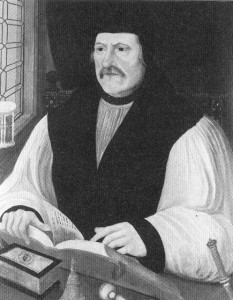
A few weeks ago, I wrote about how, at the end of April 1536, Anne Boleyn had asked her chaplain, Matthew Parker, to ensure that Elizabeth was looked after if anything happened to her. Did Anne have an inkling that she was in danger or was she just simply taking precautions and protecting her daughter’s future? It’s hard to know, but it is likely that Anne was aware of just how precarious her position was, as it relied on her giving Henry VIII a son, something she had not managed to do yet.
The choice of Matthew Parker is an interesting one. Yes, he was a man of God and was close to Anne, being her chaplain and also possibly a relative of her sister-in-law, Jane Boleyn (nee Parker), but he was also the member of an influential group of men, men who would be responsible for her daughter’s education and her subsequent rise to power. This makes me feel that Anne knew exactly what she was doing when she picked Parker as Elizabeth’s protector!
Author Robert Parry has written a two part post on this very subject and I have just published Part One over at The Elizabeth Files – see “The Cambridge Connection”. The more I learn about Anne Boleyn, the more I am astounded by her intelligence and foresight. Elizabeth I may not have truly known her mother but her rise to be Queen of England, and one of England’s greatest monarchs, owed much to her mother’s planning back in 1536. Please read Robert’s wonderful article.
Anne may very well have realised the precarious nature of her position due to her failure to have a son, although the nature of her downfall could surely never have been envisioned. She certainly had the gift of foresight as far as her daughter was concerned: perhaps a mother’s intuition? She did everything possible to ensure Elizabeth’s safety, wellbeing and future. And I think she envisioned Elizabeth as a future Queen, because it was also about family, and Elizabeth was a Boleyn.
I suppose Anne’s care for Elizabeth raises the spectre of Thomas Boleyn, because although I can never condone his behaviour at the time of Anne and George’s arrests, up to that point he didn’t do too badly as a parent. He went to great lengths to give them educations which set them up in life, and there is no evidence to suggest he was the man depicted in The Tudors. In a time of intense adversity, unlike his remarkable children, he sadly diidn’t rise to the challenge, but irrespective of that I think Anne may not be overly happy with the way her father is depicted so often in fiction.
We’ve been discussing this in the forums, too. (Come on in!) Anne couldn’t have put her daughter in better hands to ensure that Elizabeth wouldn’t be raised in the old (Catholic) ways. The wisdom of Anne doing so can be demonstrated by Jane’s untimely death resulting in her son being raised with beliefs antithetical to Jane’s own.
Elizabeth’s upbringing, both good and bad, made her the strong woman and fabulous monarch she would become. Anne’s choice of who to entrust with her precious daughter was spot-on, especially considering the enormous amount of stress and danger Anne was in when she did so.
Anne was wise enough to think about the long term, and to consider what she could do to counteract the possibility of her not being able to influence her daughter’s upbringing, whether by divorce and banishment, or as it turned out, by death. This just increases my admiration for this remarkable woman.
I am fully convienced that Anne knew, but she was smart enough to not let on.Elizabeth meant more to Anne than anything and she did well in choosing Matthew Parker as her daughter’s protector. She knew that it was possible she’d never see her precious baby girl again so she needed to feel confident that someone would push forward Elizabeth’s intrest if it couldn’t be her.
I think it’s interesting that as queen, Elizabeth named Matthew Parker her first Archbishop of Canterbury. Was it as a reward for honoring her mother’s wishes?
Hello folks!
Just to say, glad you enjoyed the article, and thank you for your comments. Many thanks also to Claire for hosting it here.
That might be part of it, Audra, but she spent her entire childhood with this man. I’m sure she considered him a faithful friend as well as the father figure who’d mentored and protected her. She knew his true religious and political beliefs and his true feelings for her, which made him most trustworthy for such an important office. She inherited her mother’s knack for knowing whom she could trust in a world of sycophants, spies, double-agents and people greedy and grasping enough to flip allegiances quickly; as well as those she’d have to keep a sharp eye on and never entirely trust.